by M. C. Jennings | May 19, 2023 | Academics, Alumni Spotlight, COBA Faculty, COBA Staff, College Decisions, Current Students, Faith Infusion, Human Resource Management, Management, Outcomes, Student Spotlights, Student Spotlights
Written by special contributor Lance Fleming
Each day, students across the ACU campus display the university’s mission to educate students for Christian service and leadership throughout the world through their actions and acts of service on the campus. Each year, students like those are nominated by their academic departments. From those nominations, 50 scholars are selected by the ACU Faculty Senate to receive the University Scholars Award for their graduating class.
Among those 50 scholars who demonstrated outstanding scholarship by maintaining a grade point average (GPA) of 3.5 or higher, earning 90 hours towards their degree, and continuing the pursuit of knowledge in their research field, seven are students from the College of Business Administration. The COBA students who received this year’s University Scholars Award are Kathryn Crawford, Gracie Isham, Matthew Roberson, Will Harris, Diego Lozano Welsh, Ben Blackmon, and Garrett Powell.
We have been highlighting each of those seven individuals over the last few weeks, including this profile of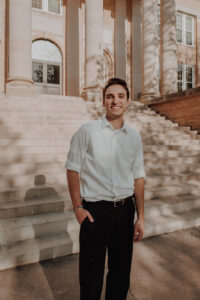 Diego Lozano Welsh. A native of Coppell, Texas, Diego recently graduated with a 3.87 GPA as a business management major. In June, he will begin work as a Talent Acquisition Specialist for Sinacola, a construction company in Frisco, Texas.
Diego Lozano Welsh. A native of Coppell, Texas, Diego recently graduated with a 3.87 GPA as a business management major. In June, he will begin work as a Talent Acquisition Specialist for Sinacola, a construction company in Frisco, Texas.
As a student, Diego – a member of Frater Sodalis – was instrumental in reviving the Lighthouse Catholic Student Organization, which was hit hard by COVID in 2020 and almost disappeared. But with the help of sponsors and parishes in Abilene, Diego led the effort to bring the organization back to campus. He was also part of Lynay, and as a freshman, he began doing volunteer work with “Palm House Kids,” a group that provides children from lower-income families a meal and a place to play and teaches them about Jesus.
Diego recently answered a few questions about his time at ACU and in COBA, covering everything from his most influential class to the most unique thing he’s been a part of while at ACU:
Q: What is the most important thing you’ve learned about yourself at ACU?
Welsh: “The most important thing I’ve learned about myself is that I have been equipped to spread the gospel. I learned how to involve my faith in everything that I do. This allows me to show my hope in Christ and bring that hope to others.”
Q: What professor or class has impacted you most and why?
Welsh: “Dr. Matt Deeg greatly impacted my development during college. I was lucky enough to have a class with him for three consecutive semesters. During those semesters, I changed my major and concentration a few times. He walked with me each time, having conversations to help lead me in the right direction. He was a fantastic teacher whom I learned a lot from professionally. However, the most significant impact he had in my life was personally, as a mentor and a friend.”
Q: What has been your experience in COBA?
Welsh: “I have loved every moment in COBA. I got to work as a COBA student ambassador during my senior year, giving tours to high school students and working in the offices for recruitment. That allowed me to have a different perspective on COBA. I saw the faculty and staff every day and experienced the culture in COBA. This was such a fantastic opportunity; it allowed me to build relationships with everyone working there and see them as real people: these relationships and all the experiences I had in COBA combined into a beautiful experience at ACU.”
Q: Of all the things you’ve experienced at ACU, what do you believe will have the most impact on your life?
Welsh: “The relationships I built will be the most impactful. The way that I learned to build relationships with mentors and the friendships I developed will shape how I live the rest of my life.”
by M. C. Jennings | May 5, 2023 | Academics, COBA Faculty, Current Students, Faith Infusion, Financial Management, Management, Outcomes, Research, Social Entrepreneurship, Student Spotlights, Uncategorized
Written by special contributor Lance Fleming
Each day, students across the ACU campus display the university’s mission to educate students for Christian service and leadership throughout the world through their actions and acts of service on the campus. Each year, students like those are nominated by their academic departments. From those nominations, 50 scholars are selected by the ACU Faculty Senate to receive the University Scholars Award for their graduating class.
Among those 50 scholars who demonstrated outstanding scholarship by maintaining a grade point average (GPA) of 3.5 or higher, earning 90 hours towards their degree, and continuing the pursuit of knowledge in their research field, seven are students from the College of Business Administration. The COBA students who received this year’s University Scholars Award are Kathryn Crawford, Gracie Isham, Matthew Roberson, Will Harris, Diego Lozano Welsh, Ben Blackmon, and Garrett Powell.
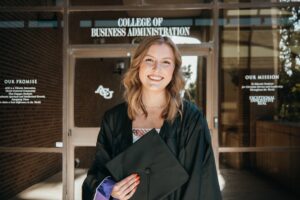 We will highlight each of the seven over the next month, including this profile of Kathryn Crawford. A native of Flower Mound, Texas, Kathryn carries a 4.0 GPA and is graduating with a BBA degree double majoring in Financial Management and Management with a concentration in Leadership. After graduation, she will travel this summer and serve as a Resident Advisor for the Leipzig Study Abroad program.
We will highlight each of the seven over the next month, including this profile of Kathryn Crawford. A native of Flower Mound, Texas, Kathryn carries a 4.0 GPA and is graduating with a BBA degree double majoring in Financial Management and Management with a concentration in Leadership. After graduation, she will travel this summer and serve as a Resident Advisor for the Leipzig Study Abroad program.
Kathryn is a member of Sigma Theta Chi and participated in Sing Song with her club each of the last two years. As a freshman, she was in Sing Song and directed a Freshman Follies Hall act. She also volunteered at Palm House as a freshman and sophomore and worked in the Lytle Center for Faith and Learning.
Kathryn recently answered a few questions about her time at ACU and in COBA, covering everything from her most influential class to the most unique thing she’s been a part of while at ACU:
Q: What is the most important thing you’ve learned about yourself at ACU?
Crawford: “I grow the most when I am challenged. Even though it can be difficult, pushing myself out of my comfort zone has been pivotal to my development personally, academically, and spiritually.”
Q: What professor or class has impacted you most and why?
Crawford: “The class that impacted me most at ACU was International Business. I had the opportunity to take this course abroad during my junior year when I spent a semester in Leipzig, Germany. I not only learned how countries engage with one another, but I was also able to experience first-hand how businesses operate outside the United States. Touring companies such as BMW and Leipziger Messe allowed me to gain a new perspective on the possible operations and organizational structures of businesses in a way that would not have been possible in a traditional classroom setting. I came to appreciate cultural collaboration and international business through this course and plan to pursue this area more in my future career.”
Q: What has been your experience in COBA?
Crawford: “For someone who didn’t know exactly what she wanted to do entering college, I could not have ended up in a better place to explore my passions and cultivate my skills than COBA. Surrounded by encouraging faculty, I uncovered new areas of interest each year. The support I experienced from a few specific professors, such as Dr. Jody Jones, helped me find my affinity for research and ignited a desire to continue my education beyond a bachelor’s degree. With unique courses such as social enterprise consulting and S.T.A.R., I immersed myself in real-life situations that forced me to apply classroom concepts to actual projects. Most importantly, I will walk away most grateful for the integration of faith into every single aspect of my experience from my time at ACU. Between equipping courses like Leadership Summit and the consistent spiritual encouragement from my professors, particularly Dr. Marquardt, I was exposed to an incredibly unique experience. I leave ACU well-rounded and equipped to enter life as a young professional with confidence only possible from the strong foundation in knowledge, faith, and purpose that COBA cultivated.”
Q: Of all the things you’ve experienced at ACU, what do you believe will have the most impact on your life?
Crawford: “My semester abroad will have the most impact on my life. This experience gave me a new perspective on the world around me and my role in it. I came to appreciate living outside my normal, everyday comforts and continually found myself enamored by the cultural nuances surrounding me everywhere I traveled. It solidified my ability to love and appreciate my neighbors regardless of their customs, traditions, or beliefs. I hope that I never stop seeing the world with the awe and wonder I felt during this time, and I pray that God will use that for his glory wherever life leads me.”
by M. C. Jennings | Apr 21, 2023 | Academics, COBA Faculty, Current Students, Faith Infusion, International Business, Social Entrepreneurship, Uncategorized
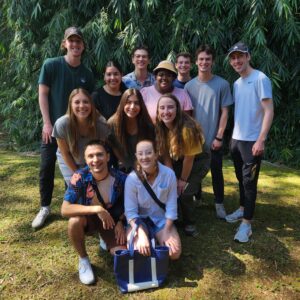 Written by special contributor Lance Fleming
Written by special contributor Lance Fleming
While most students around the country spent their Spring Break taking a break from college work and getting away from all things academia, 10 ACU students and their two professors spent a week in Costa Rica as part of the requirement for COBA’s Social Enterprise Consulting Class working with local entrepreneurs to launch products made from materials donated by Southwest Airlines.
Dr. Laura Phillips and Dr. Jennifer Golden are teaching the class this semester and took the students to Costa Rica to work with the husband-and-wife duo of Lynne Corvaglia and Chris Riquelme, who are creating “upcycled” bags and other products from leather donated by the United States’ busiest airlines.
As part of Southwest Airlines’ “Repurpose with a Purpose” program, each of the company’s fleet of airplanes is overhauled every four years, and as a part of that process, the seat leather is replaced. The leather pulled out of the planes is donated to nonprofit organizations for upcycling projects. One of the Southwest refurbishment facilities is in El Salvador, and the leather from that location has been donated to a university in Turrialba, Costa Rica, called CATIE.
CATIE is primarily an agricultural university, but it does have economic development as an area of focus.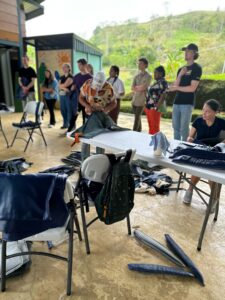 That is part of the university with which ACU students have partnered this semester. In addition to donating a warehouse full of airline seats, Southwest has also provided funds for CATIE to build a leatherworking workshop and to provide training for people in the area who are interested (primarily women). The women come from around the region to learn leatherworking and business skills.
That is part of the university with which ACU students have partnered this semester. In addition to donating a warehouse full of airline seats, Southwest has also provided funds for CATIE to build a leatherworking workshop and to provide training for people in the area who are interested (primarily women). The women come from around the region to learn leatherworking and business skills.
The idea is to create a business incubator to launch businesses as people graduate from the training program. Jobs are also being created in rural communities because CATIE receives intact seat covers that must be deconstructed before they can be upcycled into new products.
And that’s where the ACU students come in.
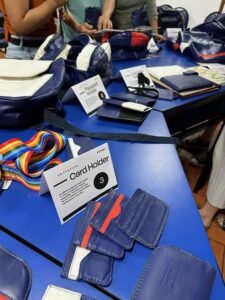 The students’ client is called Wearsos – the first business to come out of the leather project – and it was started by Corvaglia and Riquelme. Aside from upcycled bags, the company also plans to make other products like passport holders, wallets, luggage tags, and shoes, but according to Phillips, the initial launch will be with three different styles of bags.
The students’ client is called Wearsos – the first business to come out of the leather project – and it was started by Corvaglia and Riquelme. Aside from upcycled bags, the company also plans to make other products like passport holders, wallets, luggage tags, and shoes, but according to Phillips, the initial launch will be with three different styles of bags.
“Our task this year is to support Lynne and Chris as they get ready to launch their products,” Phillips said. “While we were in Turrialba, Costa Rica, we conducted focus groups with two different target markets: faculty, staff, and students on the CATIE campus, as well as Southwest Airlines employees.
“The first set of focus groups were done in person, while the Southwest Airlines focus groups were conducted via Zoom,” she said. “Our students are sorting through the information we collected through those sessions to provide marketing help to Lynne and Chris as they decide how to position the three products. That will also allow us to help them with information about shipping because they are working through the logistics of getting products from Costa Rica to the United States and Canada.”
The goal for the class, Phillips said, is to complete “one or two” consulting projects for the client, in this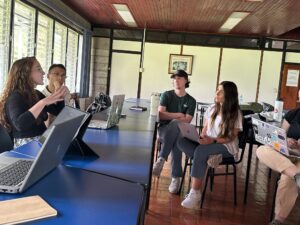 case, Wearsos. So far, in four years of teaching the class, each client has been in Costa Rica, although Philips said future classes could certainly take on a domestic client or a client in a foreign country other than Costa Rica. Phillips also said that she wants the students to learn problem-solving and critical-thinking skills each year to serve them when they enter the workforce.
case, Wearsos. So far, in four years of teaching the class, each client has been in Costa Rica, although Philips said future classes could certainly take on a domestic client or a client in a foreign country other than Costa Rica. Phillips also said that she wants the students to learn problem-solving and critical-thinking skills each year to serve them when they enter the workforce.
What the students will find, Phillips said, is that the context and scope of the project will always change between the start of the semester and the time they return from the Spring Break trip. In addition, the on-site schedule over Spring Break is always fluid, forcing students to adjust their plans, which is more difficult for some students than others.
“We want the students to become much more comfortable dealing with ambiguity and learning to be flexible, both in a project context and a general life context,” Phillips said. “We hope the students learn how to be good team members. Most students have had several group projects by this point in their college careers. In many of these cases, the work is distributed unevenly across the team, with some students pulling more than their weight and others free riding. This is an opportunity for them to work in a group where everyone wants to be involved and contribute.
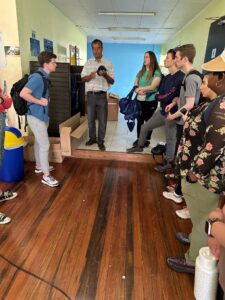 “Finally, we hope the students will learn that consulting (and any cross-cultural project) is a co-creation between the parties involved,” she said. “We do not go to Costa Rica to solve our clients’ problems or fix their issues. We work with the client to develop solutions that will work in their context. We try hard to squash the ‘savior’ complex that people in general – and Americans specifically – sometimes bring to other contexts. We also try to cultivate the idea that everyone has valuable ideas and skills to bring to the project.”
“Finally, we hope the students will learn that consulting (and any cross-cultural project) is a co-creation between the parties involved,” she said. “We do not go to Costa Rica to solve our clients’ problems or fix their issues. We work with the client to develop solutions that will work in their context. We try hard to squash the ‘savior’ complex that people in general – and Americans specifically – sometimes bring to other contexts. We also try to cultivate the idea that everyone has valuable ideas and skills to bring to the project.”
The class was not only beneficial for the entrepreneurs and partners in Costa Rica but also for the students that attended. For many, it was life-changing. Senior marketing major, Angel Smith, said, “I learned new things from a brand-new culture and was humbled by the experience. This experience has influenced my current professional goals in changing the purpose behind applying meaningful work that can serve a higher purpose. It also humbled my experience of what it means to be successful; on our trip, Dr. Eliecer Vargas, the professor at CATIE who is in charge of the leatherworking project, said that finding happiness in your worth is also finding happiness from within, not just looking for monetary value. This past semester, I have worried about finding a job that will bring financial gain, but this trip has shown me that there is value in the community you surround yourself with. Five years from now, I could see myself working for a company with a program or even starting an outreach program supporting giving back and empowering communities in need.”
Angel’s words echo the mission and values of the College of Business: As a Christian college of business and technology, we call our members to faith and vocation, learning and innovation, students and relationships, and excellence and impact. We can’t wait to see what fruit comes from the seeds that have been planted for both our partners and our students.
by M. C. Jennings | Mar 23, 2023 | Academics, COBA Faculty, COBA Staff, Current Students, Faith Infusion, Uncategorized
Written by special contributor Lance Fleming
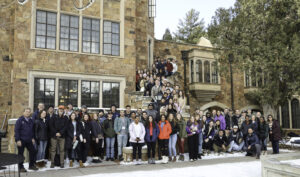
The Leadership Summit Class of 2023
Old friends mingled with new faces once again this year as ACU was able to host Leadership Summit in January, the first time since 2020 that the university’s Christ-focused leadership development course had been able to meet.
Established in 1998 in the College of Business Administration, Summit is a one-week, 3-hour course hosted in picturesque Colorado. The course blends academic rigor with an environment ripe for deep, personal, and lasting encounters with Jesus. The course ran for 23 consecutive years until COVID forced its cancellation in 2021. The group was set to meet at Crooked Creek camp in Fraser, Colorado, in 2022 until a water pipe burst just before everyone arrived, forcing the cancellation of the entire course.
Summit 2023 returned to its birthplace – Glen Eyrie Castle in Colorado Springs, Colorado – where founders Dr. Rick Lytle, Tim Johnston, and Mike Winegaert hosted the first meeting in 1998. The tone for this year’s week-long stay was set by best-selling author Mo Aiken, who spoke on the evening of January 7, kicking off the event.

Mo Aiken
“Mo Aiken was our kickoff speaker, and she crafted such a unique and tailored vision for our students,” said Dr. Dennis Marquardt, Associate Professor of Management and Director of the Lytle Center for Faith and Leadership. “One of my students wrote on his exam, ‘The first night that Mo Aiken spoke, she spoke with such fire and passion that set the tone for the week. She saw something that God desired for this group and was able to inspire all of us to strive for that same vision.’ Mo set a clear tone that living for Christ isn’t an add-on but an all-encompassing relationship upon which everything else is based.”
From there, speakers like Elise Mitchell (‘83), founder of the Mitchell Communications Group, Rick Atchley (‘78), Teaching Minister at The Hills Church of Christ, Tony Roach (‘01), Senior Vice President for Marketing and Customer Experience for Southwest Airlines, Mike Willoughby (‘86), CEO of PFSweb Inc., and Greg Feasel (‘80), President and CEO of the Colorado Rockies – as well as many others – opened their hearts to the attendees. Message after message of openness about sin and struggles and connecting it to leadership took everyone to a place where, as Marquardt said, “we realized that it is in our weakness that we are strong. God delivers and redeems and makes broken things beautiful.”
Jenny Fridge (‘92), Director of Community Relations for The Sanctuary Foster Care Services in Fort Bend County, attends with her husband, Eric (‘91), who is currently the Director of Advancement Officers for the university. She agreed that the spiritual air in 2023 differed from years past.
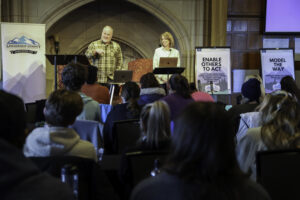
Eric and Jenny Fridge
“Leadership Summit is our favorite way to begin a new year,” Jenny said. “We have lost count, but I think we’ve attended the last seven or eight Summit experiences, and we’ve been a mentor couple for students, and at this Summit, we were able to speak to students on one of the last days of the week to encourage them in their next steps as they headed back to campus.
“While every year is similar, and we even have returning speakers from year to year, each Summit class is uniquely different,” she said. “This year, this group had a notable air of spiritual maturity. While these students have seen their share of brokenness, they also seemed very self-aware, repentant, and committed to their walk with the Lord. There was a maturity in this group that had not been as evident in years past. Personally, this gave me hope and optimism for our future. Case in point: our first grandbaby was born the Monday we were at Summit, and during one of our group sessions that evening, the students asked if they could pray for us! It was a precious moment and meant the world. Again, a simple reflection of the spiritual maturity of this special group.”
One of the event’s founders – Dr. Lytle, who spoke to the group about the transforming power of His presence – said even he sensed a renewed spirit at this year’s meeting.
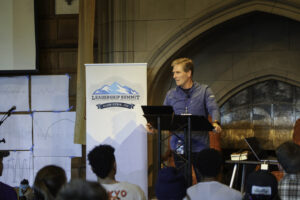
Dr. Rick Lytle
“As I approached Glen Eyrie Castle, my mind flashed back to 25 years ago when we started this dream of pouring into students in a unique way,” he said. “I was hopeful that if we invited God to the mountain to join us, He would favor us with His presence as He did with Moses. I hoped that He would transform us more and more into His image so that we might authentically serve and lead with His power to bless humanity and expand and advance God’s Kingdom work.
“God’s spirit moved palpably among us,” Lytle continued. “Students were changed each day – conversations were different, their thoughts were different, their eagerness was different, and finally, their surrender was more fully leveraged for His glory and pleasure.”
In fact, on the final evening of Summit, four people decided to give their lives to Christ in baptism. Those students didn’t know that when Lytle arrived, he asked the general manager at Glen Eyrie if they had a baptistry, a pond, or a tank in case someone there needed to be baptized. The GM even said to Lytle, “you guys actually do the plunge thing.” Lytle answered in the affirmative.
On the morning of the final day, Shane Jennings (‘89) – husband of ACU’s M.C. Jennings (‘91), the Student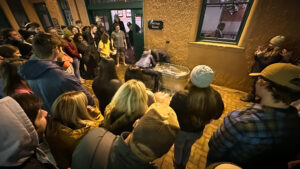 Engagement and Marketing Manager in COBA – went to an ag store in the area and bought a feed trough with the hope that it would need to be used that day. When the staff learned that it would be necessary for four students, they formed a “hot water bucket brigade” to fill the trough for the baptisms, which would take place outside in 20-degree temperatures.
Engagement and Marketing Manager in COBA – went to an ag store in the area and bought a feed trough with the hope that it would need to be used that day. When the staff learned that it would be necessary for four students, they formed a “hot water bucket brigade” to fill the trough for the baptisms, which would take place outside in 20-degree temperatures.
“These awesome students were baptized into Christ by faith on all accounts,” Lytle said. “Dr. Marquardt and I had the privilege of baptizing them in the feed trough. On our departure, we, in faith, left the feed trough there for next year’s use.”
The movement of the Spirit among those who were in Colorado that week was easy to see and feel. And it provided a sense of renewal for Heather Fortner (‘97), current CEO at SignatureFD. She hadn’t participated in an ACU event in 25 years but quickly found that the Holy Spirit was in that place.
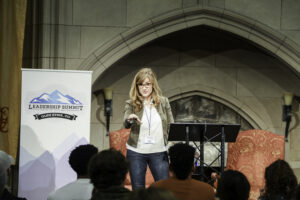
Heather Fortner
“The goodness and faithfulness of Jesus were on full display at this year’s Leadership Summit,” she said. “It’s so easy to forget the power, and holiness one encounters when a group of God-fearing people takes the time to step away from the normal day-to-day of life and seek Jesus wholeheartedly. The opportunity to share my heart and a few lessons I have learned while highlighting how the Lord has guided every step of the journey was a stark reminder of Jesus’s calling for each of our lives.”
Fortner said she prayed for months about what the Lord wanted her to share at this year’s meeting and kept hearing the same two words come back to her: But God. Over the next few weeks, she said, God revealed to her four areas that she has struggled with as a leader and continually needs reminding that He is in charge: fear, focus, forgiveness (of others and self), and faith.
“This was my first Leadership Summit, but I can say the Spirit of the Lord was clearly present and actively working in the hearts of all who were there,” she said.
Allee Casey, who will graduate from ACU in May, was one of 80 students enrolled in Summit 2023, and she said she left Colorado believing each of the 16 speakers she heard over the six days at Glen Eyrie was speaking directly to her.
“It just felt like most of the speakers were talking about issues that I see in my life,” Casey said. “Each
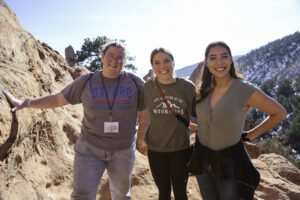
From L to R: Allee Casey, Laura Kate Masters, and Laney Aguilar
speaker had their own message and some personal story that made their lesson all the more impactful. I left each session with a new idea for improving my life. My internal dialogue was no longer ‘That’s just how it is,’ or ‘I was born like this,’ or ‘they’ll never change.’ It was now a hope that I could improve my life and that my decisions and relationships weren’t previously dictated to fail by genetics, fate, or whatever reason.”
All that from someone hesitant to attend the event.
“I was honestly regretting signing up for Summit,” Casey said. “I didn’t need the credit, I had a ton on my plate leading into the new year, and it just seemed like something I didn’t want or need. But I figured since my family was paying for it, I should go in with a good attitude to learn something. And boy, did I learn something. The speakers brought their ‘A-game,’ and everyone could tell and became as invested as I did. It was just such an atmosphere of learning that you don’t normally see, even on a college campus.”
The planning and preparation for Leadership Summit 2024 has already begun. The dates for this one-week, 3-credit, short course are January 6th – 12th. Summit is open to all undergraduate ACU students of any major. To learn about Leadership Summit 2024 you can contact the Lytle Center for Faith and Leadership at lytlecenter@acu.edu or go to lytlecenter.org/summit.
by M. C. Jennings | Jan 30, 2023 | Academics, COBA Faculty, COBA Staff, Faith Infusion, Uncategorized
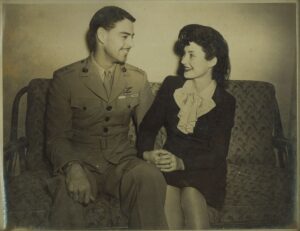
The late Dr. Bill and Janie Dukes have given, through their estate, more than $29 million to the College of Business – the largest single academic gift in ACU’s history.
Written by special contributor Lance Fleming
The lifeblood of any university – and individual colleges within the university – are donors. Alumni and friends of the university who generously give back to the place that has made a mark on their lives to enrich the next generation of leaders.
Abilene Christian University is no different. It was the hard work of the university’s founder and first president. A.B. Barret, who got Childers Classical Institute off the ground. He pounded the dirt roads of West Texas via horse and buggy in the winter and spring of 1906, raising money for his vision of a Christian university. He secured gifts from 195 individuals around Abilene for a grand total of $3,500. Not bad, considering that would now be worth more than $115,000 in 2022 money.
Those generous donors provided for expansion from Childers Classical Institute when it opened in 1906 to the current robust university. Childers started with 25 students in a single building. Today, the university serves more than 5,000 students and offers 79 undergraduate degree programs and more than 160 fields of study in numerous disciplines.
Every gift and every donor made a difference and helped Barret’s idea of a Christian university in Abilene become a reality. As ACU president Dr. Phil Schubert (’91) wrote in the case study for the university’s current capital campaign, Higher Ground, “I believe Barret, who was certainly a man with great vision, would have had difficulty imaging the national university ACU is today.”
Dr. Brad Crisp, the Dean of the College of Business Administration, has seen first-hand the impact donors make on campus and a specific college.
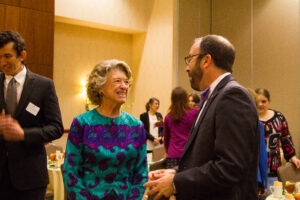
Ann Griggs Berger with accounting professor Dr. Clint Buck at the Ruth Allen Griggs Honor Luncheon.
“Simply put, donors make it all possible,” he said. “At the beginning of my time as dean, I remember a particular week when COBA received gifts from three women who had recently lost a loved one, a husband or a father. Because all three contributions came in the same week, it was hard for me to miss the impact that ACU and COBA had on each of those families.
“I realized that the gifts we receive often flow from experiences and relationships from a long time ago, rather than fundraising being something that drives donors now,” Crisp said. “People often assume that asking for money is scary or off-putting, but I find it’s an honor to talk with people about their passions. I like to find out what motivates them to give, and to help them find opportunities to support the students, faculty, staff, and alumni that mean so much to them.”
And now the university’s Higher Ground campaign is once again calling on those people and other friends of the university to push ACU to new heights in its second century of educating students for Christian service and leadership throughout the world. The $250 million campaign is, by far, the largest fundraising initiative ever undertaken by the university. It will transform the university in ways that Barret could never have foreseen.
The university has designated $118 million to “Enhance and Increase Transformational Experiences” and the other $132 million to “Strengthen and Elevate ACU’s Academic Profile.” COBA and the building it has called home for more than 35 years – the Mabee Business Building – are part of the Higher Ground campaign.
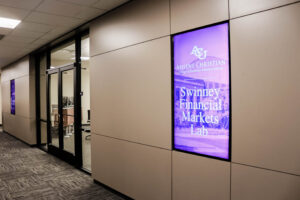
The new Swinney Financial Markets Lab gives students interested in careers in finance a state of the art classroom experience.
Preparing the next generation of students in COBA for the needs and technological advancements in the workforce was at the forefront of the renovations the building has undergone. Students and staff returned for the start of the 2022-23 school year to an updated classroom wing and reimagined learning spaces for students. A more advanced and visible finance lab will provide students with industry tools to practice real-life trading with faculty mentors at their sides, and an upgraded digital experience lab will add more room for this growing technology program.
But it’s not just giving to the physical brick-and-mortar spaces that make a difference in the lives of ACU students. Donors give to scholarship funds, helping attract more students to the university and, in particular, COBA, thanks to the Nicholson-Upp Endowed Scholarship, among others. Donors also provide their time and expertise to return to campus and share their knowledge with the next generation of business leaders.
“Donations come in many forms, and we would not be able to provide the professors, the facilities, or the transformative experiences without them,” said COBA Assistant Dean Tim Johnston. “We are fortunate that our alumni are generous people. Their generosity of time is also critical to our success. Alumni return to campus and share insights that help set students on a different career trajectory. Our alums help students understand what it takes to break into various career fields.
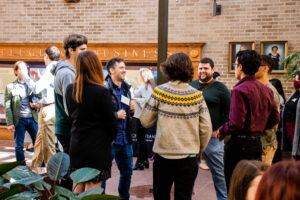
Members of COBA’s Visiting Committee network with students.
“The day-to-day performance of our alumni provides us with a great reputation of excellent workers who are a pleasure to work with,” Johnston said. “That opens the doors to exciting employment opportunities for our graduates.”
Jane Clark – Enrollment and Student Success Manager at COBA – said that connection is powerful in shedding light on how donors make a difference in the lives of students, faculty, and staff.
“The COBA difference at ACU is built on the foundation of strong connections,” Clark said. “Connections among our students, staff, faculty, and alumni. With the generosity of our alumni comes the strengthening of those relationships on our campus through fellowship, experiences, and opportunities. A student comes to ACU seeking a business or technology degree, but they graduate with so much more. We want to inspire, equip, and connect Christian business and technology professionals … with the vision and service of our students past, present, and future. That is so much more than an ACU COBA degree; it is the building of a legacy.”
It’s part of a legacy that began with A.B. Barret’s dream in 1906, a legacy that lives on today in all that exists thanks to the people who have believed in that dream.
by M. C. Jennings | Nov 2, 2022 | Academics, COBA Faculty, COBA Staff, College Decisions, Current Students, Faith Infusion, Professional Development, Uncategorized
Written by special contributor Lance Fleming
It only takes a few seconds of studying the mission of ACU’s College of Business Administration (COBA) to discern that the holistic development of its students is as important as anything else that goes on in the Mabee Business Building.
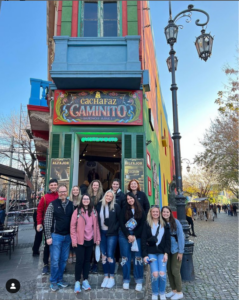
Dr. Andy Little and students during their Study Abroad trip to Montevideo last summer.
The first point of the mission statement is “holistic student learning and development.” That part of the mission goes on to say that ACU “seeks spiritual, academic, and professional growth over the life of each student through exemplary teaching, experiential learning, and relationships with Christian faculty, professional staff, and engaged alumni.”
It’s all part of equipping the next generation of global leaders with all the tools necessary to be successful in their homes, in their places of worship, in their communities, and in their places of work.
“While great teaching is essential to what we do, we want to emphasize how our students learn and develop both inside and outside the classroom,” said Dr. Brad Crisp, Dean of the College of Business Administration. “That is why we are partnering with the university in the design and implementation of the Compass initiative.”
The Compass initiative begins with a customized roadmap showing the key experiences the student can choose during their time at ACU. Then, they can utilize the Compass app or website to gain access to badges and activities that they can pursue at the appropriate times during their journey. The student will also have a record of their co-curricular experiences during their time at ACU and within COBA.
Crisp and Derran Reese – Director of Experiential Learning – presented this initiative at the Suitable conference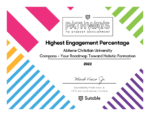
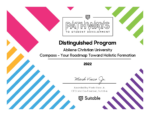 last summer in Philadelphia where ACU Compass won two awards: Highest Student Engagement (91% engagement rate) and The Distinguished Program Award. Suitable provides the technology platform supporting the Compass initiative. Reese said Compass was designed to help students engage in various activities and experiences that help them grow in various ways: intellectually, spiritually, professionally, etc.
last summer in Philadelphia where ACU Compass won two awards: Highest Student Engagement (91% engagement rate) and The Distinguished Program Award. Suitable provides the technology platform supporting the Compass initiative. Reese said Compass was designed to help students engage in various activities and experiences that help them grow in various ways: intellectually, spiritually, professionally, etc.
“We must think about creating an integrated student experience,” Reese said. “Designing curricular and co-curricular activities should be intentional, and we need to communicate to students that these activities all contribute to their holistic development. That is why we designed Compass.”
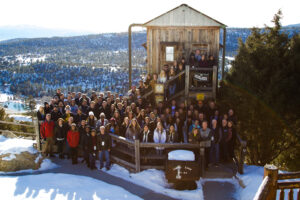
Leadership Summit 2020 attendees (a program of the Lytle Center for Faith and Leadership).
Compass, however, is about more than the teaching that goes on in the classroom. It is about merging different experiences into the classroom, engaging students in projects and internships, and providing opportunities for them to lead in student organizations, etc. It’s about bringing in speakers and employers, going on Study Abroad trips, and participating in the Griggs Center or Lytle Center. It’s not just what is done inside the classroom.
“We have a BBA badge for our pre-business students and are working on reformatting the professional development badge and including a Lytle Center badge,” said M.C. Jennings, Student Engagement and Marketing Manager for COBA. “We want students to be able to keep track of all of their accomplishments and have a portfolio that they will be able to share with future employers that show all of the things they were involved in (Study Abroad, speakers, special projects), holds their resume and cover letter, has academic accomplishments, etc. Eventually, we hope to have more class assignments tied to Compass through Canvas. This is a tool that will enable students to track their academic, professional, personal, and spiritual growth throughout their time at ACU.”
And all of this is part of the holistic learning environment being fostered in COBA, an environment that is necessary for students preparing to enter the world away from ACU.
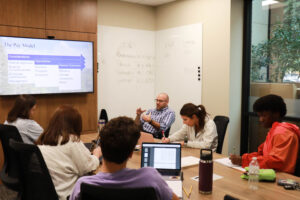
Dr. Matt Deeg takes students out of the regular classroom to learn about HR in a more interactive setting.
“Excellence is demanded of our graduates upon graduation,” said Tim Johnston, Assistant Dean of COBA. “Professors have the tough task of teaching to a high standard and evaluating a student’s ability to complete the assignments to standard. At ACU, our class size and Christian mission make the learning experience very personal. Striking the balance between objective assessment and personal care for an individual student is complex. Our professional development program and alumni connections help support the need for a student to achieve learning excellence.”
But, Reese said, that learning excellence must now include many different facets than might have been required even as few as five years ago.
“Today education is more holistic, and the responsibility of a university – particularly a Christian university – is to help form the whole student. That means that curriculum and pedagogy matter, and additional equipping of students with professional and life skills is vital. Expanding their awareness of diverse cultures and peoples, while developing the type of character that will enhance their careers and bless the world are challenges we address with focused intentionality.”
 Diego Lozano Welsh. A native of Coppell, Texas, Diego recently graduated with a 3.87 GPA as a business management major. In June, he will begin work as a Talent Acquisition Specialist for Sinacola, a construction company in Frisco, Texas.
Diego Lozano Welsh. A native of Coppell, Texas, Diego recently graduated with a 3.87 GPA as a business management major. In June, he will begin work as a Talent Acquisition Specialist for Sinacola, a construction company in Frisco, Texas.  We will highlight each of the seven over the next month, including this profile of Kathryn Crawford. A native of Flower Mound, Texas, Kathryn carries a 4.0 GPA and is graduating with a BBA degree double majoring in Financial Management and Management with a concentration in Leadership. After graduation, she will travel this summer and serve as a Resident Advisor for the Leipzig Study Abroad program.
We will highlight each of the seven over the next month, including this profile of Kathryn Crawford. A native of Flower Mound, Texas, Kathryn carries a 4.0 GPA and is graduating with a BBA degree double majoring in Financial Management and Management with a concentration in Leadership. After graduation, she will travel this summer and serve as a Resident Advisor for the Leipzig Study Abroad program. Written by special contributor Lance Fleming
Written by special contributor Lance Fleming That is part of the university with which ACU students have partnered this semester. In addition to donating a warehouse full of airline seats, Southwest has also provided funds for CATIE to build a leatherworking workshop and to provide training for people in the area who are interested (primarily women). The women come from around the region to learn leatherworking and business skills.
That is part of the university with which ACU students have partnered this semester. In addition to donating a warehouse full of airline seats, Southwest has also provided funds for CATIE to build a leatherworking workshop and to provide training for people in the area who are interested (primarily women). The women come from around the region to learn leatherworking and business skills. The students’ client is called Wearsos – the first business to come out of the leather project – and it was started by Corvaglia and Riquelme. Aside from upcycled bags, the company also plans to make other products like passport holders, wallets, luggage tags, and shoes, but according to Phillips, the initial launch will be with three different styles of bags.
The students’ client is called Wearsos – the first business to come out of the leather project – and it was started by Corvaglia and Riquelme. Aside from upcycled bags, the company also plans to make other products like passport holders, wallets, luggage tags, and shoes, but according to Phillips, the initial launch will be with three different styles of bags. case, Wearsos. So far, in four years of teaching the class, each client has been in Costa Rica, although Philips said future classes could certainly take on a domestic client or a client in a foreign country other than Costa Rica. Phillips also said that she wants the students to learn problem-solving and critical-thinking skills each year to serve them when they enter the workforce.
case, Wearsos. So far, in four years of teaching the class, each client has been in Costa Rica, although Philips said future classes could certainly take on a domestic client or a client in a foreign country other than Costa Rica. Phillips also said that she wants the students to learn problem-solving and critical-thinking skills each year to serve them when they enter the workforce. “Finally, we hope the students will learn that consulting (and any cross-cultural project) is a co-creation between the parties involved,” she said. “We do not go to Costa Rica to solve our clients’ problems or fix their issues. We work with the client to develop solutions that will work in their context. We try hard to squash the ‘savior’ complex that people in general – and Americans specifically – sometimes bring to other contexts. We also try to cultivate the idea that everyone has valuable ideas and skills to bring to the project.”
“Finally, we hope the students will learn that consulting (and any cross-cultural project) is a co-creation between the parties involved,” she said. “We do not go to Costa Rica to solve our clients’ problems or fix their issues. We work with the client to develop solutions that will work in their context. We try hard to squash the ‘savior’ complex that people in general – and Americans specifically – sometimes bring to other contexts. We also try to cultivate the idea that everyone has valuable ideas and skills to bring to the project.”



 Engagement and Marketing Manager in COBA – went to an ag store in the area and bought a feed trough with the hope that it would need to be used that day. When the staff learned that it would be necessary for four students, they formed a “hot water bucket brigade” to fill the trough for the baptisms, which would take place outside in 20-degree temperatures.
Engagement and Marketing Manager in COBA – went to an ag store in the area and bought a feed trough with the hope that it would need to be used that day. When the staff learned that it would be necessary for four students, they formed a “hot water bucket brigade” to fill the trough for the baptisms, which would take place outside in 20-degree temperatures.







 last summer in Philadelphia where ACU Compass won two awards: Highest Student Engagement (91% engagement rate) and The Distinguished Program Award. Suitable provides the technology platform supporting the Compass initiative. Reese said Compass was designed to help students engage in various activities and experiences that help them grow in various ways: intellectually, spiritually, professionally, etc.
last summer in Philadelphia where ACU Compass won two awards: Highest Student Engagement (91% engagement rate) and The Distinguished Program Award. Suitable provides the technology platform supporting the Compass initiative. Reese said Compass was designed to help students engage in various activities and experiences that help them grow in various ways: intellectually, spiritually, professionally, etc. 
